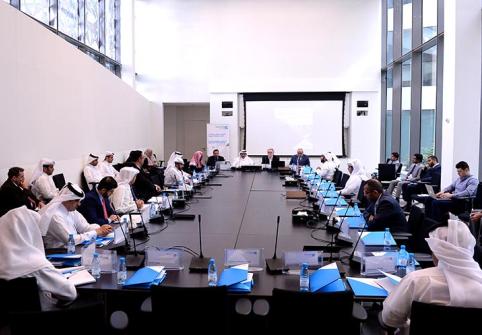News
HBKU Hosts Roundtable on Islamic Finance, Fintech, and Cryptocurrencies
10 Dec 2017The Center for Islamic Economics and Finance (CIEF), part of the College of Islamic Studies (CIS) at Hamad Bin Khalifa University (HBKU), organized a roundtable to explore how Islamic finance stakeholders, regional financial institutions, and regulators are viewing developments in Fintech and cryptocurrencies, and whether these financial institutions are planning to integrate these innovations into their business models. The keynote address was delivered by HE the Governor of Qatar Central Bank, Sheikh Abdullah Saud Al-Thani, whilst Professor Volker Nienhaus, former president of University of Marburg, Germany, and a well-known scholar of Islamic economics and finance, chaired the discussion.

The event, which was held late last week, witnessed the participation of some of the most experienced Islamic finance leaders, academics and CEOs. The sessions were based on a moderated open discussion and followed an approved agenda. HBKU students were invited to take advantage of this opportunity and meet with industry leaders, while networking for future internship and employment opportunities.
In his remarks at the Islamic Finance, Fintech and Cryptocurrencies roundtable, HE Sheikh Abdullah Saud Al-Thani said: “The Islamic finance industry has grown considerably over the past decade to become one of the fastest growing financial systems today. By contrast, other conventional banking systems have been challenged significantly by the global financial crisis. This becomes evident with growing interest in the various investment opportunities available within the Islamic finance industry, prompting many traditional banks – including those in non-Islamic countries – to diversify their offerings and integrate Islamic financial services, with the ultimate aim of expanding their client base.”
Celebrating HBKU’s objective of being a national resource of knowledge – serving government, industry, and society in Qatar – Dr. Emad El-Din Shahin, dean of the College of Islamic Studies, noted: “It is vital that we give our students every opportunity to grow and learn. The roundtable is a unique experience for Qatar’s future leaders and innovators to meet with the industry elite, gain first-hand knowledge and advice, and be presented with real-world examples of the latest issues that the Islamic finance industry faces.”
This year’s discussion addressed the recent growth and development of fintech and cryptocurrencies, and their implications on the local economy in general and on the Islamic finance industry in particular. The first part of the event focused on the local, regional, and global use of financial technology, known more commonly in the industry as fintech. This refers to a blend of innovative technology used to implement financial services, such as through online crowdfunding platforms and mobile payment systems. Participants shared their views on the potential challenges they anticipate to face in the financial institutions where they work, and on how different people and organizations view cryptocurrencies, Insurtech, and RegTech in the region.
The second segment honed in on the benefits and unintended consequences of adopting fintech. This included a two-hour discussion on using fintech to greater facilitate SME financing, how those working in markets with under-developed credit registries can utilize fintech, the robo-advisers movement within the asset management industry, and whether we will see collaboration or competition spark between traditional financial institutions and innovative fintech platforms.
Dr. Syed Nazim Ali, director of CIEF, commented: “I am thankful to CIS and HBKU for their confidence and trust, and for providing assistance in organizing the roundtable. We appreciate the participation of industry leaders and regulatory authorities and for supporting the event. CIEF looks forward to strengthening these relationships for events to come. Today’s event provided an opportunity for all stakeholders to discuss this important topic as we have observed that the banking industry is facing significant disruptions to their business models from the rapid developments in fintech. We therefore felt it was a timely topic for discussion.”
The roundtable lecture series was initially launched in 2015 to act as a catalyst and as a dedicated communication channel between Islamic financial institutions and academics, with the aim of discussing perennial and new issues and products in the industry. Previous roundtables have discussed topics such as the expectations and reality of Islamic finance and the role Islamic finance plays in financing infrastructure projects.
